
Flamenco, in its strictest sense, is a professionalized art-form based on the various folkloric music traditions of southern Spain in the autonomous communities of Andalusia, Extremadura and Murcia. In a wider sense, it refers to these musical traditions and more modern musical styles which have themselves been deeply influenced by and become blurred with the development of flamenco over the past two centuries. It includes cante (singing), toque, baile (dance), jaleo, palmas (handclapping) and pitos.

The Gipsy Kings are a group of flamenco, salsa and pop musicians from Arles and Montpellier in the south of France, who perform in Andalusian Spanish. Although group members were born in France, their parents were mostly gitanos, Spanish gypsies who fled Catalonia during the 1930s Spanish Civil War. They are known for bringing Catalan rumba, a pop-oriented music distantly derived from traditional flamenco music, to worldwide audiences. The group originally called itself Los Reyes.
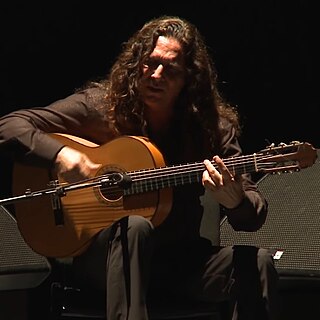
José Fernández Torres, known as Tomatito, is a Spanish flamenco guitarist. Having started his career accompanying famed flamenco singer Camarón de la Isla, he has made a number of collaborative albums and six solo albums, two of which have won Latin Grammy Awards.

Sabicas was a Spanish flamenco guitarist of Romani origin.
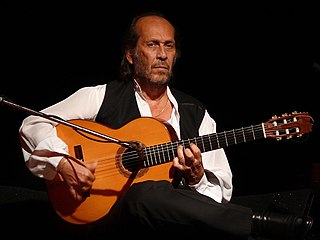
Francisco Gustavo Sánchez Gomes, known as Paco de Lucía[ˈpä.ko̞ ð̞e̞ lu.ˈθi.ä], was a Spanish virtuoso flamenco guitarist, composer, and record producer. A leading proponent of the new flamenco style, he was one of the first flamenco guitarists to branch into classical and jazz. Richard Chapman and Eric Clapton, authors of Guitar: Music, History, Players, describe de Lucía as a "titanic figure in the world of flamenco guitar", and Dennis Koster, author of Guitar Atlas, Flamenco, has referred to de Lucía as "one of history's greatest guitarists".
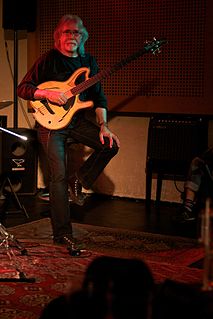
Carles Benavent is a flamenco and jazz bassist.

Juan Peña Fernández, also known as Juan Peña "El Lebrijano" or simply El Lebrijano, was a Spanish Gitano (Roma) musician.
The cante flamenco, meaning "flamenco singing", is one of the three main components of flamenco, along with toque and baile (dance). Because the dancer is front and center in a flamenco performance, foreigners often assume the dance is the most important aspect of the art form - but in fact, it is the cante which is the heart and soul of the genre. A cante singer is a cantaor or cantaora.

Entre dos aguas is the first compilation album by the Spanish guitarist and composer Paco de Lucía.
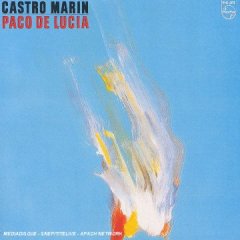
Castro Marín is the thirteenth studio album by the Spanish composer and guitarist Paco de Lucía. All songs were written by Paco de Lucía.

Paco de Lucía interpreta a Manuel de Falla is the twelfth studio album by the Spanish composer and guitarist Paco de Lucía. All the pieces were written by Manuel de Falla.

Dos guitarras flamencas en stereo is the first of three collaborative albums between Paco de Lucía & Ricardo Modrego.

La fabulosa guitarra de Paco de Lucía is the first solo studio album by Paco de Lucía.
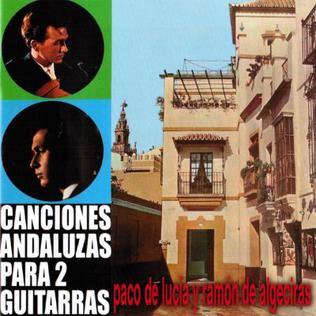
Canciones andaluzas para 2 guitarras is the first of four collaboration albums by Paco de Lucía and Ramón de Algeciras.

El mundo del flamenco is an album by Paco de Lucía.

Live... One Summer Night is a live album by Paco de Lucía Sextet, the band formed by famous flamenco guitarist Paco de Lucía.
Cada Vez que Nos Miramos is a 1970 flamenco album by Camarón de la Isla and Paco de Lucía.
Ramón Sánchez Gómez, better known by his stage name Ramón de Algeciras, was a Spanish flamenco guitarist, composer and lyricist. He was the most prolific collaborator of Paco de Lucía, his younger brother, recording with him on most of his albums from the 1960s to 1980s and performing with him throughout much of his life as a rhythm guitarist, including the Paco de Lucía Sextet, formed in 1981, which also included his other brother Pepe de Lucía.
















